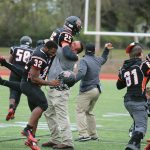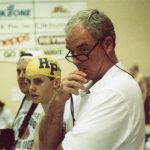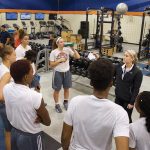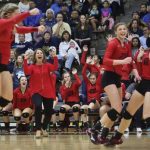
By Leigh-Ellen Romm
 hen athletes come off the field, who is right there with praise or a word of correction? After an athlete thinks he has given his all, who asks for more? The coach.
hen athletes come off the field, who is right there with praise or a word of correction? After an athlete thinks he has given his all, who asks for more? The coach.
And, who is watching for grades, and good habits, and conduct off the court? When an athlete thinks she is all alone, who steps in? The coach.
Coaches help athletes develop to their full potential. They train them in their sport by analyzing their performances, instructing in relevant skills, and providing encouragement. And they wear many hats: bus driver, tutor, and first responder. For many young athletes, a coach serves as a mentor, a lifeline, and for some—an important lead to a job down the road.
These Austin College alumni who entered careers in coaching played different sports in different decades. Some knew they wanted to be coaches from the beginning; others got there as fast as they could.
They share an appreciation for their liberal arts educations, a passion for their teams, and a belief that they were coached by the best at Austin College.
Editor’s Note: |
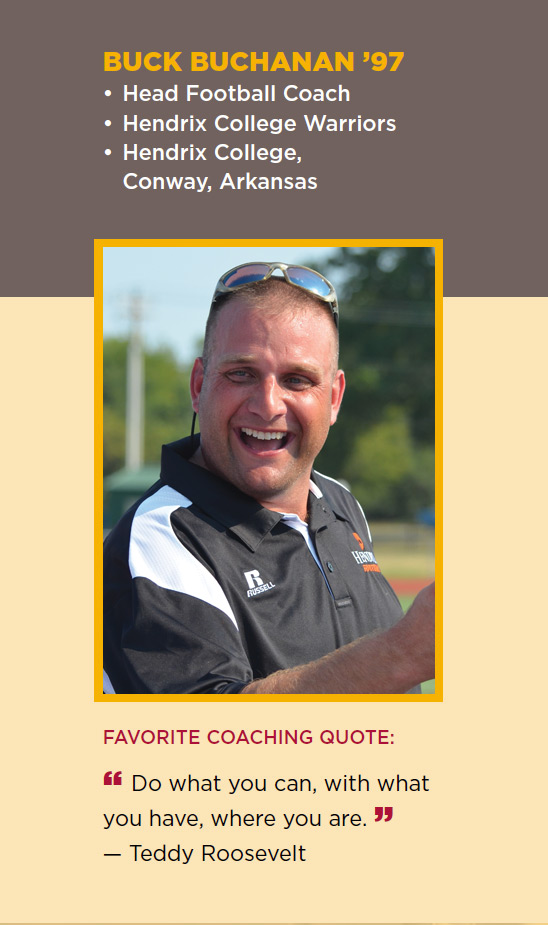 Justin “Buck” Buchanan ’97 never faced a Hendrix College football team when he played for the ’Roos. Hendrix did not have a football program—and would not until 2013 when the former Austin College lineman wore the whistle as the first head coach in 53 years.
Justin “Buck” Buchanan ’97 never faced a Hendrix College football team when he played for the ’Roos. Hendrix did not have a football program—and would not until 2013 when the former Austin College lineman wore the whistle as the first head coach in 53 years.
“I knew I fit in here at Hendrix, and I think that being an academically oriented DIII coach is in my wheelhouse,” Buck said. In his first season as coach, he had only 52 players. Because everyone got more field time, the coach feels the players got better faster.
“We have gone from last place to the playoffs in three years,” Buck said, “using a simple philosophy: don’t wait to get good. You can’t live soft and play tough, so just do your best when you have the opportunity. That is a direct reflection of how I was coached.”
When Buck lists the names of his Austin College coaches it sounds like a list of all-time ’Roo heroes: Bob Mason ’52, Mel Tjeerdsma, Vance Morris, Sig Lawson, and current athletic director David Norman ’83. “I always wanted to go to Austin College,” Buck, originally from nearby Denison, Texas, said. “It was in my backyard, and I wanted to play for those coaches.” He graduated cum laude, with majors in communications and exercise and sport science and earned his Master of Arts in Teaching degree in 1999 through the Austin Teacher Program.
Buck said he believes Division III student-athletes choose colleges for the academic rigor, but if they couldn’t play the games they love, they might choose to attend elsewhere.
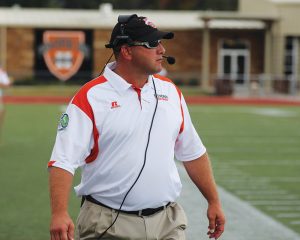 “The thing I like most about the Division III athletics is that it’s a relationship based process, not a business-based one,” Buck said. “We recruit our guys by looking at three things: academics, character, and then athletic ability. Of course, you want to bring the right students for the team. But I’m glad that I never have to say to a student, ‘Hey, you have to end your college education because I’m giving your scholarship to that guy over there.’”
“The thing I like most about the Division III athletics is that it’s a relationship based process, not a business-based one,” Buck said. “We recruit our guys by looking at three things: academics, character, and then athletic ability. Of course, you want to bring the right students for the team. But I’m glad that I never have to say to a student, ‘Hey, you have to end your college education because I’m giving your scholarship to that guy over there.’”
“An important piece of the puzzle is this: you can be smart and a great football player, or other athlete, or artist, or whatever you want to be. You can do all you want to do, but you must learn about time management,” he said. “I learned that while at Austin College. A big part of my success beyond Austin College is what I learned from faculty John and Jane White in the Austin Teacher Program.”
“Education is the sum total of life experiences,” Buck said. “Some people draw a line and say, ‘we are going to be winners in life, but it is okay if we lose on the field.’ I just don’t adhere to that mentality. I didn’t as a student-athlete because I wanted to be my best in the classroom and on the field.”
“On my team, we live by three things. First, no foolish penalties. Second, no botched assignments. And, third, 11 brothers can’t be beat,” he said. Translated to the rest of life, he said this means don’t do dumb stuff, do what is expected, and, above all, build relationships.
“You can play, but ultimately they will let the air out of the ball,” he said. “Even if you play professionally, it doesn’t go on forever. You’re going to be a dad. You’re going to be a husband. You’re
going to have a job. All the philosophies I use on the field, work off the field.”
![]()
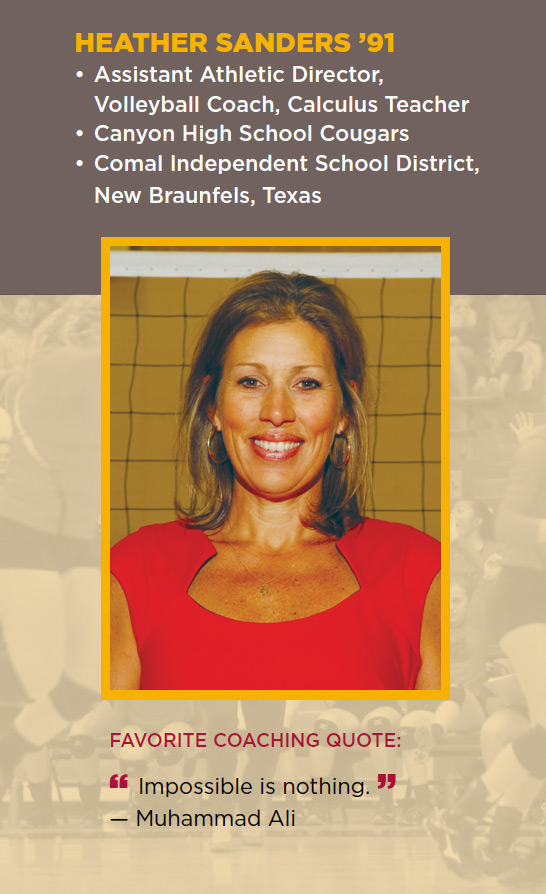 Heather Woods Sanders ’91 carries her coaching persona into the classroom. “I coach both volleyball and calculus to win,” she said. “I want my kids to succeed on the AP Calculus exam so we take an ‘US vs. THEM’ approach to the AP test.”
Heather Woods Sanders ’91 carries her coaching persona into the classroom. “I coach both volleyball and calculus to win,” she said. “I want my kids to succeed on the AP Calculus exam so we take an ‘US vs. THEM’ approach to the AP test.”
Heather coaches volleyball and teaches calculus at Canyon High School in New Braunfels, Texas. Through the support of her family, Heather said she was led to believe that she could do whatever she wanted in life.
“My middle school and high school coaches and teachers were some of the most influential people in my life, and they are the reasons I ultimately chose the profession,” she said. “I felt called to coach so that maybe I could be to others what those coaches and teachers were to me.”
After earning her Austin College degree in 1991, Heather earned teacher certification in math at the University of Texas. She taught at Bryan High School while her husband, Brien ’91, completed his master’s degree at Texas A&M. After three years as an assistant coach at her high school alma mater in New Braunfels, she was hired at Canyon High, where she has spent 23 years, 18 of those working as head coach.
 The Canyon High School Cougars have a diverse campus with just under 50 percent of the student body identified as minority.
The Canyon High School Cougars have a diverse campus with just under 50 percent of the student body identified as minority.
“My liberal arts education gave me an appreciation for all sorts of perspectives on all sorts of issues,” Heather said. “As an educator, you encounter people from many backgrounds and perspectives on life.” Heritage classes, study abroad in Paris, and an international studies class in Washington, D.C., laid her foundation of broadened thinking. On that foundation, she works with her students to see them reach their own potential.
“I push them hard and I want a strong work ethic from everyone in my class. I try to create a culture where it is okay to fail as long as you learn from mistakes and are better the next time.”
![]()
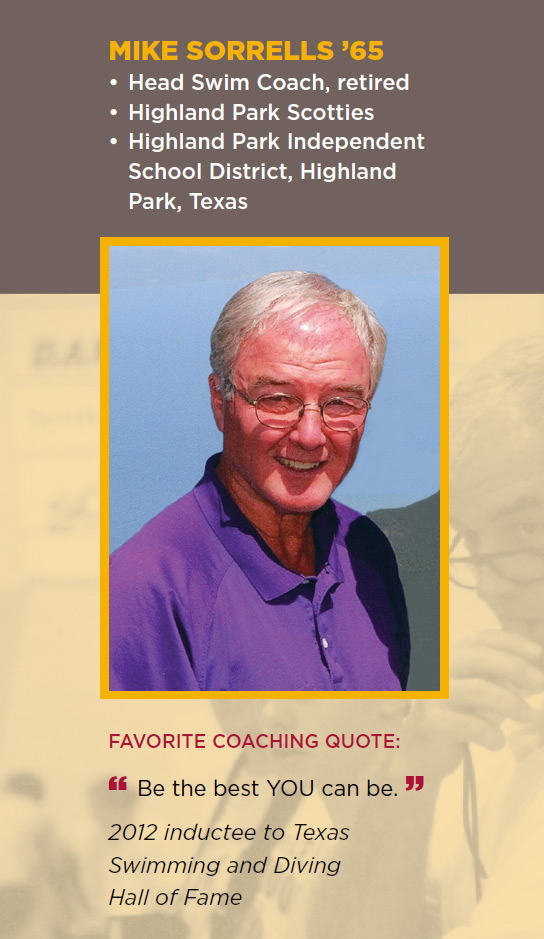 Mike Sorrells ’65 earned a business degree and expected to go to work using it. Although he had played football at Austin College and had minored in physical education, coaching was not the original plan. But, plans change.
Mike Sorrells ’65 earned a business degree and expected to go to work using it. Although he had played football at Austin College and had minored in physical education, coaching was not the original plan. But, plans change.
“I’ve known people who have said they wanted to be a coach for as long as they can remember,” he said. “I’m not one of them. I think it just evolved as I realized I really liked sports, especially football, and thought it might be a fun way to make a living,” he said.
For 33 years, he made a living and a difference in the lives of athletes. It started with a homecoming of sorts when Mike’s former Highland Park High School football coach offered him a job right out of college. He took that offer, and the next year, Mike got an extra $500 stipend to coach the swim team, too—and $500 went a long way in 1966 so he thought it was worthwhile. By his retirement in 2002, Mike had definitely gone the distance in the Highland Park pool, eventually devoting his coaching solely to swimming.
 Rockwall ISD opened a new Aquatic Center in 2009, and Mike came out of retirement to serve as Aquatics Director for that district. “I didn’t coach but got to hire most of the coaches and give them the same opportunity I had received except in a much fancier facility,” he said. He hung up his whistle again in 2011.
Rockwall ISD opened a new Aquatic Center in 2009, and Mike came out of retirement to serve as Aquatics Director for that district. “I didn’t coach but got to hire most of the coaches and give them the same opportunity I had received except in a much fancier facility,” he said. He hung up his whistle again in 2011.
“I was most fortunate to coach a lot of really great kids, some of whom became really good and even great swimmers,” Mike said. During his career, he coached more than 40 individual and relay state champions and sent five swimmers to the Olympics. “I tried to instill in them the idea not to cheat themselves,” he said, “to be the best they could be, not only in swimming, but in
whatever they chose to do. It was fun to see kids I coached have success at all levels of swimming but also to see those who have had remarkable success in other aspects of life.”
![]()
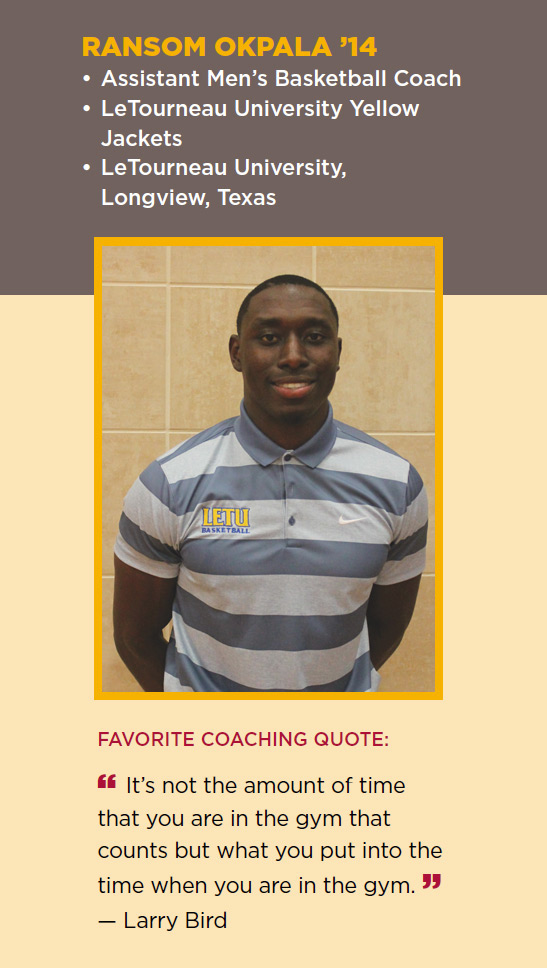 Ransom Okpala ’14 remembers being on the B team.
Ransom Okpala ’14 remembers being on the B team.
“I come from a very big family and I’m the oldest of seven,” Ransom said. “When you’re in a big family, everyone wants to find their niche. You want to be different and find something you’re good at.”
“In seventh grade I was on the A team in basketball. But in eighth grade I was on the B team. That lit a fire in me to get better,” Ransom said. “Then as I developed from eighth to ninth grade, I spent the summer training, and it led me to my craft. People would say, ‘you’re so much better!’ but I knew it was the training.”
Ransom played basketball at Austin College for four years, served as team captain for three, and was named to the All-SCAC team more than once. After earning his bachelor’s degree in finance and economics, he worked in Katy, Texas, as a business analyst and then an inside sales manager. But, he has known since he was very young that basketball was his “thing.”
Returning to his passion, Ransom started a personal training business at Lifetime Fitness. Through that he connected with many young athletes from kindergarten through 12th grade. “I worked with them in groups and individually and began to see I have many that are solely basketball athletes. Recreational basketball usually practices and plays just in the summer, so I wanted to give them something that was year-round.”
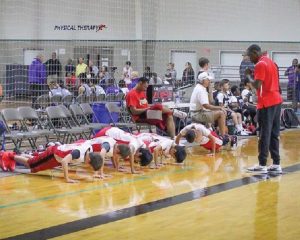 Okpala began to put together teams and now has four teams that he coaches—two eighth-grade, one sixth-grade, and one fifth-grade team.
Okpala began to put together teams and now has four teams that he coaches—two eighth-grade, one sixth-grade, and one fifth-grade team.
“The best thing about sixth-grade boys is they are really excited. They love to play. The hardest part is adding the discipline aspect to the practice and to the game,” Ransom said. “It’s interesting to see the growth in those boys. There are eighth graders who have practiced three weeks and are ready for games. The sixth graders have been practicing for two months, and they’re still not ready. It’s the child’s mind.”
He works as the only coach but says he gets support from the kids’ families. With a cooperative arrangement at Lifetime Fitness, he is able to have court time for the teams to play.
“Anyone who knows me knows I’m super competitive,” Ransom said, adding that was especially true at Austin College. “As a coach, I’ve learned to pull back a little on that. In coaching, you have to bring that edge out of each kid in his own way; that’s kind of the evil-genius thing of coaching.”
Ransom is preparing to transition his basketball genius to another, bigger court. His recent hire as assistant basketball coach at LeTourneau University in Longview, Texas, will draw particularly on his experience as a DIII student-athlete. He’ll bring his team-building experience to the recruiting effort and help players on and off the field. Transitioning over the spring, Ransom will be completely on board there by August 2017.
The new position means leaving his youth basketball teams as they develop through their critical middle school years. “I’m looking for the right coach to take this thing over. The kids mean a lot to me and, I can’t leave them with just anyone; it has to be the right person,” he said.
The right person coaches with an A team mentality. Ransom wants to encourage all athletes, growing or grown, B team or better, to find their niche and to train for strength, skill, and endurance.
![]()
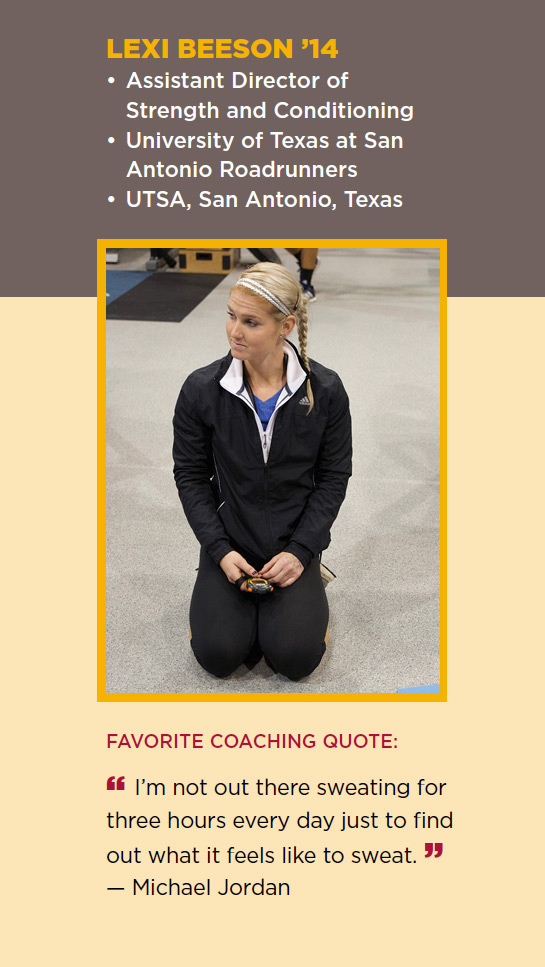 You can lead a business major to a desk job, but you can’t make her stay.
You can lead a business major to a desk job, but you can’t make her stay.
Lexi Beeson ’14, now assistant director of strength and conditioning at University of Texas at San Antonio, was preparing for her Austin College graduation and had a job offer on the table. “I was offered a position as a business analyst with a fairly prominent company and realized that the idea of sitting at a computer doing work in Excel all day wasn’t something that would truly make me happy.”
Mentor David Norman ’83 suggested the former women’s basketball team captain look into coaching instead. “I’m extremely thankful for him because I truly love my job,” she said. With her minor in exercise and sport science and commitment to her own training, Lexi transitioned to the gym.
 Lexi picked up her best coaching strategies not only on the court but also in he classroom. “I learned from my time at Austin College how to approach different students and athletes,” she said. “Austin College truly teaches you to be accepting of different cultures and people in general and to think about things from other perspectives than just your own. I think that’s extremely important in coaching as not every athlete responds to things the same way.”
Lexi picked up her best coaching strategies not only on the court but also in he classroom. “I learned from my time at Austin College how to approach different students and athletes,” she said. “Austin College truly teaches you to be accepting of different cultures and people in general and to think about things from other perspectives than just your own. I think that’s extremely important in coaching as not every athlete responds to things the same way.”
“In coaching I’ve dealt with hundreds of athletes, all with a different story and background so I think that it’s been invaluable to be able to think about how each athlete may respond to situations or coaching tactics differently and what might be most effective for each,” she said. Last year, Lexi worked with a basketball player who transferred to UTSA from another Division I school and was therefore not allowed to play for a full year. She was a serious athlete with aspirations of playing professionally after college. “I didn’t want her staying on the two-to-three day-per-week, season-maintenance lift that the rest of the girls were on,” she said. “So, I wrote her a four-day-per-week lifting and conditioning program aimed at increasing her strength, power, and speed to give her the greatest athletic advantage when she was able to participate.”
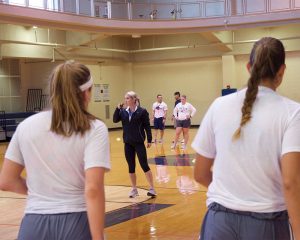 All the athletes at UTSA are Lexi’s athletes. Starting her day at 6 a.m. with the first team lift and often ending 12 hours later, she customizes the gym work according to the team, time of year, and coach’s needs. The coaching staff communicates to help Lexi bring out the athlete’s best. “Where my job is unique is that I can see each of the athletes from each of my teams all year long, whereas a softball or volleyball coach has certain times of the year where they are restricted in how much access they have to their athletes. Sometimes they aren’t allowed any hours with them at all. In the off-season times, I am typically with the athletes more than their head coaches are, so being on the same page as an entire staff is incredibly important.”
All the athletes at UTSA are Lexi’s athletes. Starting her day at 6 a.m. with the first team lift and often ending 12 hours later, she customizes the gym work according to the team, time of year, and coach’s needs. The coaching staff communicates to help Lexi bring out the athlete’s best. “Where my job is unique is that I can see each of the athletes from each of my teams all year long, whereas a softball or volleyball coach has certain times of the year where they are restricted in how much access they have to their athletes. Sometimes they aren’t allowed any hours with them at all. In the off-season times, I am typically with the athletes more than their head coaches are, so being on the same page as an entire staff is incredibly important.”

